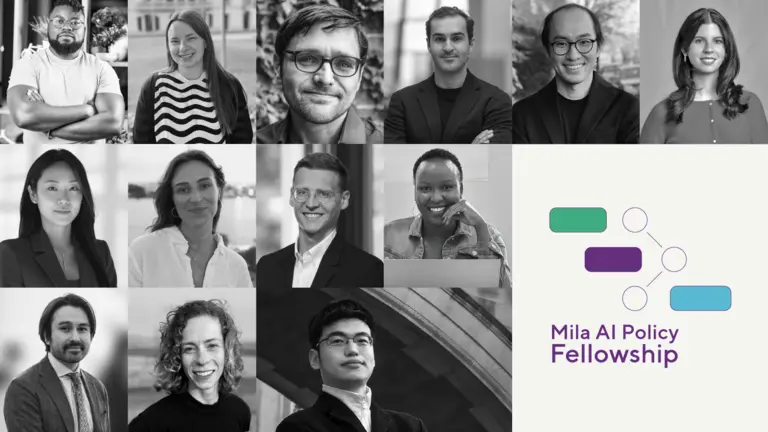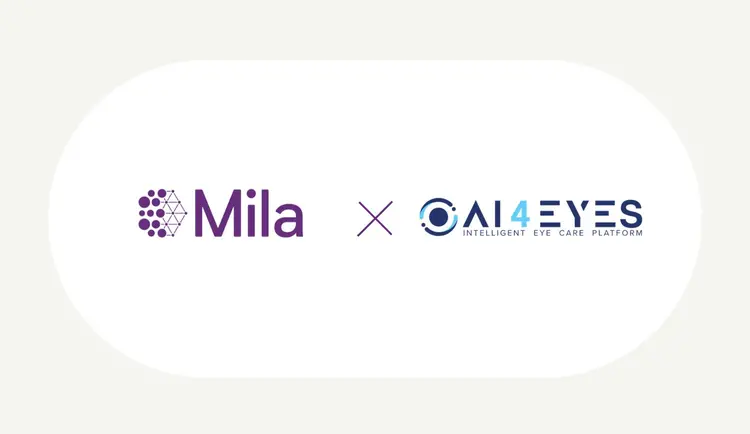
Picture of the 2025-2026 AI Policy Fellowship cohort from left to right: Adio-Adet Dinika, Alesia Zhuk, Christopher Wegemer, Elyas Felfoul, Hause Lin, Helen Hayes, Lisa Yeon-Ju Mah, Maartje Nugteren, Moritz von Knebel, Nancy Kimaiyo, Noah Favel, Sarah Bérubé and Zhongtian Sun
Montreal, August 25, 2025 — Mila is thrilled to announce the launch of the inaugural cohort of Fellows for its AI Policy Fellowship.
Designed to bridge the gap between artificial intelligence research and relevant research in other disciplines to inform sound AI policymaking, the program offers the Fellows the opportunity to work closely with Mila researchers to develop policy insights that tackle societal challenges and opportunities associated with AI development, deployment, and governance.
Over six months, each Fellow will pursue a project that addresses pressing questions in AI policy, working within one of the Fellowship’s seven thematic areas—ranging from AI safety and governance, AI adoption and productivity, and AI’s role in media and democracy, to substantive equality, climate, Indigenous rights, and public sector innovation. From exploring AI use in international relations, to strengthening humanitarian responses to climate crises with AI-driven tools and designing safer chatbots, these projects promise real-world impact.
“By bringing together experienced professionals from academia, industry, government, and civil society, the Mila AI Policy Fellowship creates a rare interdisciplinary space where technical expertise meets AI policy-driven research,” mentioned Anna Jahn, Senior Director of Public Policy and Inclusion at Mila.
In the coming weeks, these high-impact projects from our Fellows will be introduced across our social media channels. We invite you to follow us to stay up to date on the latest developments, insights, and stories from this outstanding cohort.
Meet the 2025-2026 AI Policy Fellowship cohort

Adio-Adet Dinika
Project proposal title - Governing AI From Below: Worker-Centred Frameworks for Global Algorithmic Safety and Accountability
Dr. Adio-Adet Dinika is a political scientist and AI researcher co-leading the Data Workers Inquiry at the Distributed AI Research Institute (DAIR). His research focuses on AI labour, digital colonialism, and epistemic justice from a worker-centred perspective. He holds a PhD in Political Science from the Bremen International Graduate School of Social Sciences. A former platform worker, he combines activism and scholarship, with writing featured in Noema Magazine, Africa in Fact, and peer-reviewed journals.

Alesia Zhuk
Project proposal title - The Use of Artificial Intelligence by and Before International Courts and Tribunals
Dr. Alesia Zhuk is a legal scholar focused on the intersection of law and emerging technologies. She holds a PhD from Universitat Pompeu Fabra, where she researched blockchain regulation and its legal implications. A former research Fellow at Kleros, she explored NLP for online dispute resolution. As a Fellow of The Hague Academy, she studies AI in international courts. Her broader interests include AI governance, environmental impacts, and the use of AI for social good.

Christopher Wegemer
Project proposal title - Adaptive AI, Youth Political Development, and Democracy: The Governance Challenges of Personalized Content Generation
Dr. Christopher Wegemer is a Postdoctoral Researcher at UCLA’s Luskin School of Public Affairs, advancing democratic resilience through AI governance frameworks that address civic risks of personalized political content. His work builds on research designing digital tools to reduce polarization in education. With a PhD in Education and earlier degrees in Engineering and Applied Physics, he has presented electoral reforms to California lawmakers and teaches UCLA courses on data science, social networks, and global movements.
Elyas Felfoul
Project proposal title - AI Tutors for Workforce Equity, Inclusion and Readiness
Elyas Felfoul is a global leader in education technology, innovation and policy. He directs the WISE Summit and leads partnerships for the WISE EdTech Accelerator. With expertise in EdTech, public policy, M&A, and international partnerships, he has supported over 50 ventures and advised global leaders. Elyas is part of XPRIZE’s Brain Trust, UM6P’s Deep Tech Platform, and World in 2050. He holds degrees from the University of Sherbrooke and NUS’ Lee Kuan Yew School.

Hause Lin
Project proposal title - AI Political Persuasion: Translating Evidence into Democratic Governance Policy
Hause Lin is a computational social scientist at MIT who investigates how AI systems shape information ecosystems and human decision making. Through large-scale experiments and collaborations with industry partners like Google, Meta, the World Bank Group, and the UK AI Safety Institute, he develops and tests solutions to promote healthier online environments. His interdisciplinary research translates scientific insights into actionable solutions that improve decision making and address critical societal issues arising from new technologies.

Helen Hayes
Project proposal title - Designing AI Safer Chatbots: Policy Pathways to Protect Young People in Conversational AI Ecosystems
Helen Hayes is a Doctoral Candidate in Communication Studies at McGill University, researching the governance of AI and digital technologies. A Senior Fellow at the Centre for Media, Technology, and Democracy, she focuses on tech policy, online harms, social media regulation and AI governance. Her work appears in top journals and edited volumes. She holds an Honours B.A. from the University of Toronto and an M.A. in Communication Studies from McGill University.

Lisa Yeon-Ju Mah
Project proposal title - AI Policy for Critical Mineral Recovery and Circular Economy in Mine Tailings
Lisa (Yeon-Ju) Mah is an entrepreneur and artist working at the intersection of creativity, technology, and impact. She brings over six years of experience with deep-tech startups and was Director of Ventures at the Creative Destruction Lab, helping commercialize research into scalable ventures. An Action Canada Fellow, she co-authored a report on critical minerals and AI. Trained in neuroscience, finance, and fashion, Lisa's diversified path reflects her commitment to interdisciplinary work.

Maartje Nugteren
Project proposal title - Oversight and Accountability in Inter-Agent Communication Interaction in AI Systems
Maartje Nugteren is an AI policy expert with deep experience in AI governance, international engagement, and policy development across government and industry. She led global AI policy initiatives at Meta and previously served as Head of International at the UK’s Centre for Data Ethics and Innovation, representing the UK at the OECD and Council of Europe. Maartje holds an MSc in Human Rights from the London School of Economics and Political Science.

Moritz von Knebel
Project proposal title - Future-Proof and Democratic: Designing Institutions for Governing Artificial Intelligence
Moritz von Knebel works at the intersection of technology, policy, and geopolitics. He is Chief of Staff at the Institute for Law and AI and a non-resident Fellow at fp21, the Portulans Institute, and the Oxford China Policy Lab. His research has been recognized by the UN Foundation, DAAD and the Mercator Fellowship. Moritz has worked across four continents and consults for the OECD. His work has been published in peer-reviewed journals and featured at global conferences.

Nancy Kimaiyo
Project proposal title - Harnessing AI-Driven Data for Climate-Resilient Humanitarian Decision-Making in Eastern Africa
Nancy Kimaiyo is a Monitoring and Evaluation Specialist with over seven years of experience across humanitarian and development programs in Eastern Africa. She currently supports the World Food Programme in Dadaab Refugee Camp, Kenya, focusing on food security, resilience, and data systems. Nancy emphasizes ethical, community-led data practices in fragile contexts. She holds a Master’s in Monitoring and Evaluation and has led evaluations on climate adaptation, forest restoration, and livelihoods, bridging data, technology, and inclusive policy.

Noah Favel
Project proposal title - Mandating Indigenous AI Firms for Indigenous Law in Canada
Noah Favel is a PhD candidate at McGill University researching AI-driven learning systems to improve education. With a background in law and education, he designs adaptive tools for youth and explores AI's ethical impacts. He also serves as Senior Advisor in AI to the National Chief of Canada, studying and designing AI systems for legal and education institutions. Originally from Saskatchewan, Noah is a status member of Poundmaker Cree Nation, Treaty 6, with family roots in Britain.

Sarah Bérubé
Project proposal title - Exploring the Use of AI to Create More Efficiently User-Centred Designed Public Services Online
Sarah Bérubé is a policy analyst focused on technology policy, public governance, and international relations. A 2025–2026 Fulbright Student, she is pursuing an M.A. in Public Management at Johns Hopkins University. She has worked for the OECD AI team and spent seven years with the Government of Canada. Sarah began her career in the Advanced Policy Analysts Program and holds degrees in international relations (B.A. and M.A.) from Laval University.

Zhongtian Sun
Project proposal title - Detecting Infrastructure-Level Risks in Agentic AI: Unsafe Delegation Emergent Deception, and Goal Misalignment
Dr. Zhongtian Sun is a Lecturer in AI at the University of Kent, specializing in graph representation learning, explainable AI, and LLMs. His research enhances deep learning reasoning for applications in healthcare, finance, and education. He holds a PhD from Durham University and has conducted research at Cambridge, Oxford, and the Alan Turing Institute. Dr. Sun is Co-founder and CTO of an AI-for-finance startup and serves in leadership roles at conferences like ECAI and ICLR.
Mila AI Advisors
All Fellows will be paired with one or several Mila AI Advisors alongside the Mila AI Policy Secretariat, who will provide expert guidance and collaboration throughout the Fellowship. The following Mila researchers will be participating in the Mila AI Policy Fellowship 2025/2026.
- David Ifeoluwa Adelani – Assistant Professor at McGill University, Canada CIFAR AI Chair, Core Academic Member at Mila.
- Ulrich Aïvodji – Assistant Professor at École de technologie supérieure (ÉTS), Associate Academic Member at Mila.
- Glen Berseth – Assistant Professor at Université de Montréal, Canada CIFAR AI Chair, Core Academic Member at Mila.
- Laurent Charlin – Interim Scientific Director at Mila, Canada CIFAR AI Chair, Associate Professor at HEC Montréal, Associate Professor at Université de Montréal.
- Taylor Lynn Curtis – Software Developer at Mila.
- Damiano Fornasiere – Senior AI Safety Research Scientist at LawZero.
- Jean-François Godbout – Associate Academic Member at Mila, Full Professor at Université de Montréal.
- Alex Hernandez – Assistant Professor at Université de Montréal, Core Academic Member at Mila.
- David Scott Krueger – Assistant Professor at Université de Montréal, Core Academic Member at Mila.
- Matt Kusner – Assistant Professor at Polytechnique Montréal, Core Academic Member at Mila.
- Matt MacDermott – Senior AI Security Researcher at LawZero.
- Derek Nowrouzezahrai – Associate Professor at McGill University, Core Academic Member at Mila.
- Adam M. Oberman – Full Professor at McGill University, Associate Academic Member at Mila.
- Kellin Pelrine – PhD at McGill University.
- Catherine Régis – Full Professor at Université de Montréal, Associate Academic Member at Mila.
- David Rolnick – Assistant Professor at McGill University, Adjunct Professor at Université de Montréal, Core Academic Member at Mila.
- Pierre-Luc St-Charles – Senior Applied Research Scientist at Safe AI for Humanity.






